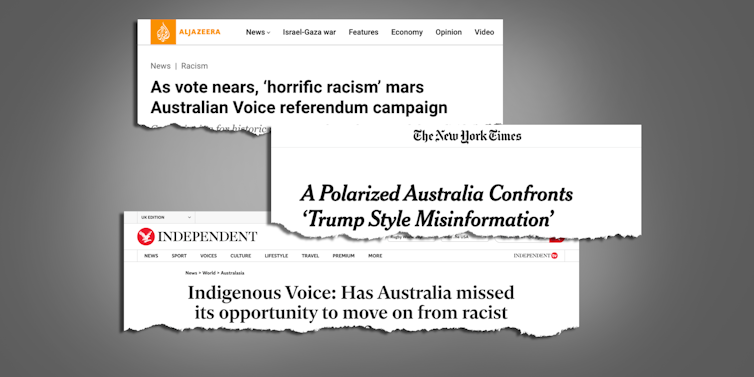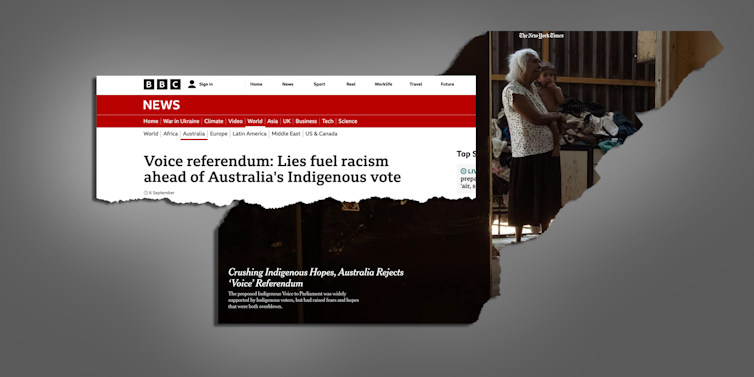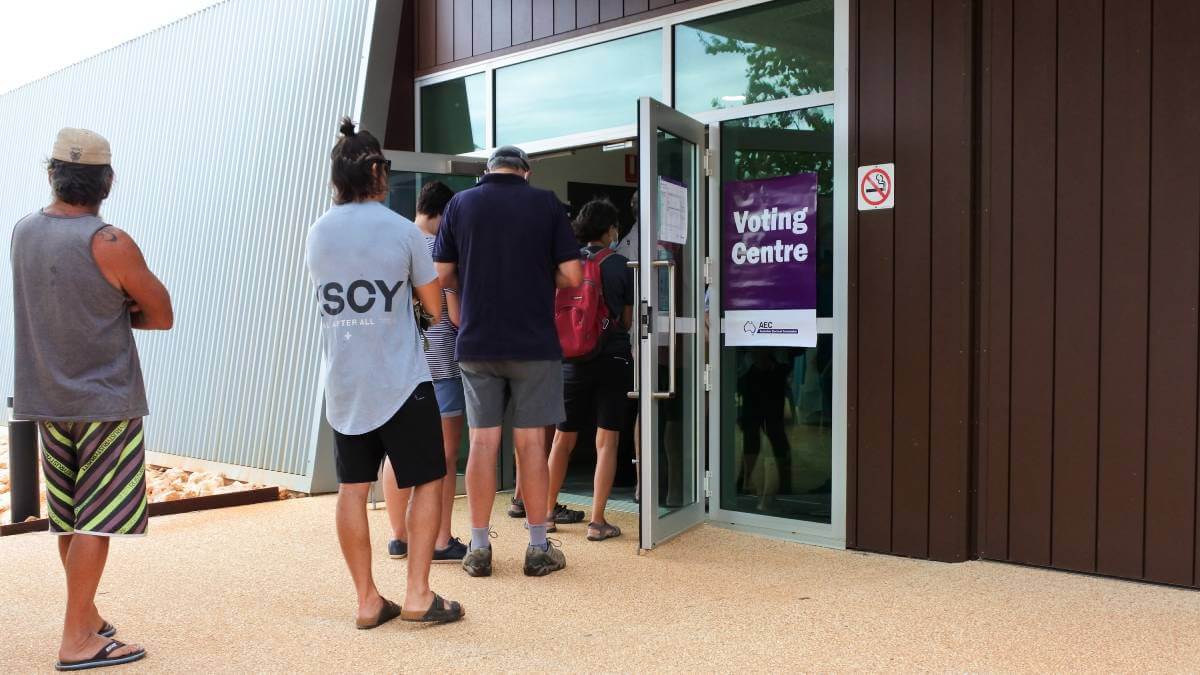Rebecca Strating, La Trobe University and Andrea Carson, La Trobe University
In recent days, news organisations around the world have sought to explain to global audiences both the Voice to Parliament referendum campaign and the result. The picture they have painted of Australia is not exactly flattering. The BBC, for example, described the win for the ‘no’ side as coming after a “fraught and often acrid campaign”.

The Conversation
The Washington Post declared it a “crushing blow” for Australia’s First Nations people who “saw the referendum as an opportunity for Australia to turn the page on its colonial and racist past”.
Even the play-it-straight Associated Press declared the rejection of the Voice as a “major setback to the country’s efforts for reconciliation with its First Peoples”. Similarly, Reuters reported on fears the result “could set back reconciliation efforts by years”.
Australia’s media warned a ‘no’ vote could be seen as evidence that Australia was a “racial rogue nation”. A crucial question, then, is whether this result will affect the way the world views Australia and, potentially, have an impact on Australia’s international relations.
‘Uncomfortable fault lines’
Much of the world’s attention over the past week has been focused on the Israel-Hamas conflict. Yet, the data we’ve been analysing from Meltwater, a global media monitoring company, showed a 30 per cent increase in mentions of the Voice to Parliament in the mainstream news and social media in the week leading up to the vote. There were 297,000 mentions in the past week, compared with 228,000 mentions the preceding week.
Much of this content was generated within Australia, but just before the referendum, there was an uptick in the number of ‘explainers’ produced by global news organisations.

The BBC, for instance, reported the historic vote had exposed uncomfortable fault lines, and raised questions over Australia’s ability to reckon with its past.
The New York Times wrote the referendum had surfaced uncomfortable, unsettled questions about Australia’s past, present and future.
A number of pieces compared Australia unfavourably with other settler-colonial nations in terms of the legal recognition of First Nations people, including New Zealand and Canada.
Japan-based Nikkei Asia reported: “Australia is the only developed nation with a colonial history that doesn’t recognise the existence of its Indigenous people in the constitution.”
An explainer by Reuters similarly pointed out: “First Nations people in other former British colonies continue to face marginalisation, but some countries have done better in ensuring their rights.”
And in an interview with Reuters, the UN’s special rapporteur on the right to development, Surya Deva, said the Voice debate had “exposed the hidden discriminatory attitude” in Australia towards Indigenous peoples.
Misinformation grabs headlines
Some international media also pointed to the large amount of misinformation that had surfaced during the campaign.
The New York Times, which had extensive coverage of the campaign, reported the country had become “ensnared in a bitter culture war” based on “Trump-style misinformation” and “election conspiracy theories”.
One blunt BBC headline explicitly linked misinformation to racism: “Voice referendum: Lies fuel racism ahead of Australia’s Indigenous vote”.
A Reuters explainer similarly reported on concerns that “racist and false narratives” had sparked fears the Voice would be a “third chamber of parliament”.
Many outlets had compared the Voice to Parliament referendum to the 2016 presidential election of Donald Trump in the US and the Brexit referendum in the UK. This referendum result, however, was less surprising and generally reflected the polls.
How will this affect Australia’s relations?
In a previous analysis piece, we wrote that most mentions of the Voice in the international mainstream media and social media had been generated by the US, followed by the UK. In the last week of the campaign, there was a 30 per cent increase in number of media mentions of the Voice (9100) from US traditional news and social media accounts, compared to the preceding week (7000).
Yet, despite the negative tone of the coverage, it seems unlikely the result will substantially affect Australia’s relations with either country. Concerns about the shifting geopolitics of the Asia-Pacific region have brought the three countries much closer in recent years. This was cemented further by the AUKUS pact.
In the Asia-Pacific region, however, leaders have no doubt been watching the referendum, even if they will not immediately comment on the result.
China’s representatives might be quiet now, but there is little doubt the ‘no’ vote will contribute to the strategic narratives that Beijing uses to blunt Australia’s criticisms of its human rights abuses on the international stage.
A measured interview with Indigenous academic and poet Jeanine Leane in China’s Global Times newspaper, for example, carried the headline “Colonialism, white supremacy loom over Australia’s aboriginal referendum”. This is, however, not entirely out of step with some of the other coverage emerging from Australia’s allies and partners.
Indian security expert Ambika Vishwanath argued in a piece for the Lowy Institute: “It seems extraordinary that a country such as Australia, one that largely aligns itself with ‘Western’ norms and values of freedom and democracy and a liberal outlook on life, has yet to recognise the people that originally inhabited the continent for close to 60,000 years.
New Delhi now has another avenue for pushback if Australia raises concerns about India’s domestic politics.
For some in the Pacific, the result will not come as a surprise. It may entrench views of Australia as a settler-colonial state unwilling to grapple with its past, including colonialism in the Pacific.
As the referendum is a domestic issue, it is unsurprising other governments’ leaders have not immediately commented publicly on the result. But this does not mean they’re not watching. The Australian government must now explain to the international community the “substantive policy steps” it is taking to close the gap in Indigenous disadvantage – a tough ask.
Rebecca Strating, Director, La Trobe Asia and Associate Professor, La Trobe University, La Trobe University and Andrea Carson, Professor of Political Communication, Department of Politics, Media and Philosophy, La Trobe University
This article is republished from The Conversation under a Creative Commons license. Read the original article.
Do you think the international reporting of The Voice was accurate? Why not share your opinion in the comments section below?
Also read: How your DNA could help solve a missing person cold case


We have lost the right to criticise other nations regarding their treatment of minorities. There is no doubt whatever about that! Well done Australia – not!
Typical woke response when a resounding consensus of opinion doesn’t go your way!
What happened was a vote AGAINST racism. In 1967 we voted to remove racism from the constitution. We voted again to keep it out.
the lefty media at it again, the Voice NO will blow over, I’m more concerned what the world thinks of the disgraceful protesters shouting GAS THE JEWS!
You would think that we have learnt by now that both sides in this latest conflict are equally to blame. The victims as usual are the civilians, that is the sad part for both sides. Also very disturbing is the fact that no-one in mainstream media mentions why the Israelis allowed this incursion to occur. This is a classic false flag attack designed to garner support to destroy the Gaza and make it part of Israel. – and Hamas leaders were complicit in this!
Ignorance, misinformation and racism meant the result was expected:
“if you don’t know, vote no” TRY INSTEAD
if you don’t know, do some research to find out.
The pre-election racist conversations, I’ve been privy were disgusting.
I used to be proud to be an Australian.
I did plenty of research and voted No. The Yes side was ignorant and out of touch with the majority. The pre-referendum racist discussions were appalling and they were from the Yes side, as was all the misinformation. Perhaps it is you who should have done some research.
What wasn’t mentioned is that many indigenous people also voted NO. This vote was more of a vote of confidence in the Australian government who has lost the trust of many of its people since the Covid debacle. The government also failed to properly explain what exactly was going to be the achieved with the YES vote.
Personally I don’t care what the world thinks of us, there was so much disinformation floating around especially from the woke lefties out there and our own media, with a special call out to our woke National broadcaster that the foreign media probably picked up on that.
The right decision was made by the voters, we need unity, we need a fair go and equal opportunity for everyone, not special treatment for some! That would have just made devision amongst us, we need to be united, if you listen to Thomas Mayo, one of the driving forces behind this farce, that’s the opposite to what he wanted.
I remember when I was young our countrymen opposing apartheid and as well we have been known to oppose the wrongs in other countries.
What now?
After the weekends vote what right would we have?
Our place in the world has changed. And not for the better.
The weekend vote was a vote AGAINST apartheid, in keeping with out historical stance on the subject.
Why is it not surprising this article has been taken from The Conversation – that well-known rag of the far left? Hardly a balanced view. The fact that the NO vote prevailed shows that Australians were not going to reinsert racism into our constitution that was removed in 1967.
And frankly right now, perhaps all those FOREIGN press claiming Australia is ‘racist’ can also dissuade their citizens from applying for residency/migration i.e. India, China. As for the USA, well, most Americans don’t even know where Australia is much less the internal machinations of our politics. They have far greater problems with their own current President and his Government.
Sad, but absolutely spot on. The misinformation card has been painfully obvious all the way through, giving a nice cover for blatant racism, and an insight into just how low Mr Dutton will stoop to clutch at power. Trump to a tee. Well done Aussie voters, sucked in nicely. The Russian bots must be killing themselves laughing at us
Amazing how Trumpian Albo and the Yes side was. Those voting No just saw through the lies and misinformation from Yes side . I remain very proud of my country and the Australian electorate. They got it right.
The US must have an obsession to scour the world to find other countries which might come close to their own racism. I’m old enough to remember bussing of black schoolchildren in the US, black singers banned from TV appearances and still banned from moving into some white communities. Unlike China we don’t have re-education incarceration camps for entire communities and the UK didn’t sanction apartheid South Africa as did others. India not long ago stripped Muslims of their citizenship and killed many while maintaining a cast system which disenfranchises millions.
Of course mention of the referendum increased as the event arrived. So too of the Polish and New Zealand elections as will be the case with the US, UK and every other election, nothing racist about that.
Given that the only known country in the world which was not colonialised was Japan; the UK was invaded around six times, the claim that Australia is the only country without an indigenous body is a totally rediculous lie.
Yes lies were told during the run up to the referendum, not least by the First Nation’s representatives by claiming they don’t have a seat at the table. They have eleven members in Federal parliament in the same way as the rest of us and they have many more representatives in State parliaments.
Now that the people have rejected another committee, because that’s what was proposed, let’s now have something alien to most politicians, an action group of talented First Nation’s people with the skills in health, education, housing and job creation to roll up their sleeves and with government funding, to start working to motivate the affected communities to fix the numerous known area of disadvantage while searching out further priorities.
What rubbish. Most would have got their information from organisations that are Voice proponents, such as the ABC.
Albanese would not give any information about the contents of the document behind the one page Uluru statement. Australia would have voted for recognition, but not to change the constitution with the Voice. Would they vote yes to something they have no information on? If it was just to form an advisory body, you don’t need to change the constitution to set up an advisory body.
I doubt the critics would have been smart enough to understand what the No campaign was based on, what Jacinta Price and Warren Mundine spoke about and what is really required to bridge the gap. It was certainly not a Voice to parliament, that would divide Australia in two.
More pertinent is this: –
Why Albanese and the Aboriginal Affairs minister were conveniently “unavailable” to meet with a delegation of outback tribal elders that came to Canberra to meet them.
Ask Albanese and the Aboriginal Affairs minister why they do not meet with the 10 Indigenous MP’s already in Canberra.
We need to understand why the Aboriginal Affairs department has proven to be incompetent in fixing the gap in a more meaningful way, despite the money it, and some hundreds of other organisations, are granted. An audit of these organisations is well overdue. They need to be held accountable for failing to bridge the gap. That is the real issue,
Nothing published in the Conversation can be regarded as adding balanced and intelligent comment to the commentary on The Voice. In real terms, other than the left wing journalists and media, the peoples of the rest of the world couldn’t care less about the Australian Constitution and the indigenous peoples.
To call the aboriginals First Nations is a distortion of the reality for purely political gain. The claims of 60 thousand years are not based on facts but wishful thinking. The first humans to walk this country were certainly not the forebears of the present mobs claiming indigenous precedence.
The dominance of the No in the Referendum has shown that the majority of Australians care deeply about an egalitarian society where all are equal under the Constitution and wish to keep us all with the same equality under our Laws.
The real primary responsibility of all levels of Government in Australia is to ensure that those who contribute the most to society can be assured of receiving a just and fair reward for their efforts and those who wish to profit from the opportunities need only take part in an equitable manner.
After speaking to many of my friends before voting (no), I came to realise that one of the biggest issues was regarding just who is a first nations person? Most of the loudest, left wing activists appeared to me to be not first nations people anyway. These were the ones who were demanding more money and “reparations” too. Just because your great, great, uncle on your sister in law’s side married a first nation person dosen’t (or shouldn’t) count. I think we should ask aboriginal elders to define exactly what a first nations person really is and then concentrate on spending the billions of dollars of welfare to target the proper recipients for funding and recognition.
Maybe people had enough of left wing ABC using taxpayer money to blast us everyday with their usual support for Labor, Albanese, and now the Voice. Also smoking ceremonies became the norm and people forever being welcomed to country. I believe a majority of the no vote fully support recognition in the Constitution, and will welcome any enquiry into where the money has gone. Obviously the 11 indigenous members of Parliament have failed the people they profess to represent.